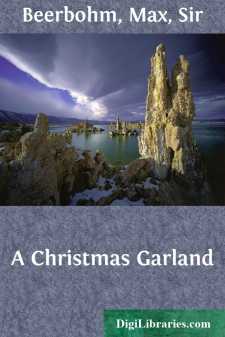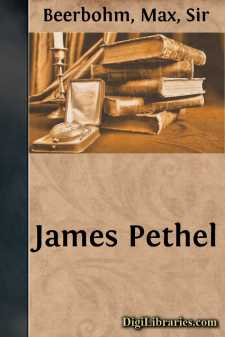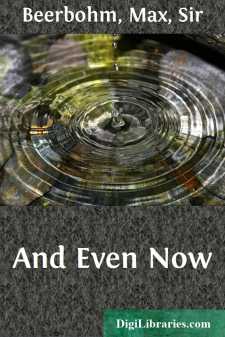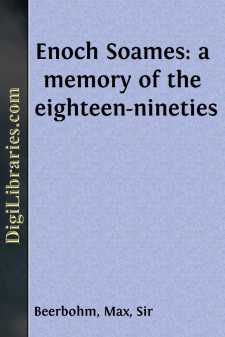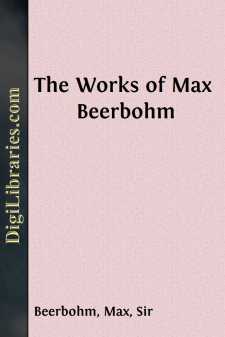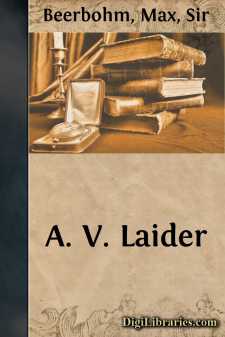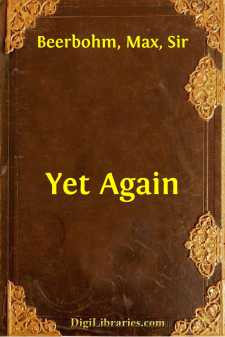Categories
- Antiques & Collectibles 13
- Architecture 36
- Art 48
- Bibles 22
- Biography & Autobiography 815
- Body, Mind & Spirit 144
- Business & Economics 28
- Children's Books 18
- Children's Fiction 14
- Computers 4
- Cooking 94
- Crafts & Hobbies 4
- Drama 346
- Education 58
- Family & Relationships 59
- Fiction 11833
- Games 19
- Gardening 17
- Health & Fitness 34
- History 1378
- House & Home 1
- Humor 147
- Juvenile Fiction 1873
- Juvenile Nonfiction 202
- Language Arts & Disciplines 89
- Law 16
- Literary Collections 686
- Literary Criticism 179
- Mathematics 13
- Medical 41
- Music 40
- Nature 179
- Non-Classifiable 1768
- Performing Arts 7
- Periodicals 1453
- Philosophy 65
- Photography 2
- Poetry 896
- Political Science 203
- Psychology 44
- Reference 154
- Religion 515
- Science 126
- Self-Help 85
- Social Science 82
- Sports & Recreation 34
- Study Aids 3
- Technology & Engineering 59
- Transportation 23
- Travel 463
- True Crime 29
Max Beerbohm
Max Beerbohm was a renowned English essayist, parodist, and caricaturist known for his sharp wit and keen social commentary. Born in 1872, he gained fame for his humorous essays and illustrations, becoming a prominent figure in Edwardian literary circles. Beerbohm's most notable works include "Zuleika Dobson," a satirical novel, and his caricatures, which captured the essence of prominent personalities of his time.
Author's Books:
Sort by:
by:
Max Beerbohm
THE MOTE IN THE MIDDLE DISTANCE By H*NRY J*M*S It was with the sense of a, for him, very memorable something that he peered now into the immediate future, and tried, not without compunction, to take that period up where he had, prospectively, left it. But just where the deuce had he left it? The consciousness of dubiety was, for our friend, not, this morning, quite yet clean-cut enough to outline the...
more...
by:
Max Beerbohm
I was shocked this morning when I saw in my newspaper a paragraph announcing his sudden death. I do not say that the shock was very disagreeable. One reads a newspaper for the sake of news. Had I never met James Pethel, belike I should never have heard of him: and my knowledge of his death, coincident with my knowledge that he had existed, would have meant nothing at all to me. If you learn suddenly...
more...
by:
Max Beerbohm
A RELIC 1918. Yesterday I found in a cupboard an old, small, battered portmanteau which, by the initials on it, I recognised as my own property. The lock appeared to have been forced. I dimly remembered having forced it myself, with a poker, in my hot youth, after some journey in which I had lost the key; and this act of violence was probably the reason why the trunk had so long ago ceased to travel. I...
more...
by:
Max Beerbohm
When a book about the literature of the eighteen-nineties was given by Mr. Holbrook Jackson to the world, I looked eagerly in the index for Soames, Enoch. It was as I feared: he was not there. But everybody else was. Many writers whom I had quite forgotten, or remembered but faintly, lived again for me, they and their work, in Mr. Holbrook Jackson's pages. The book was as thorough as it was...
more...
by:
Max Beerbohm
Dandies and Dandies How very delightful Grego's drawings are! For all their mad perspective and crude colour, they have indeed the sentiment of style, and they reveal, with surer delicacy than does any other record, the spirit of Mr. Brummell's day. Grego guides me, as Virgil Dante, through all the mysteries of that other world. He shows me those stiff-necked, over-hatted, wasp-waisted...
more...
by:
Max Beerbohm
I unpacked my things and went down to await luncheon. It was good to be here again in this little old sleepy hostel by the sea. Hostel I say, though it spelt itself without an "s" and even placed a circumflex above the "o." It made no other pretension. It was very cozy indeed. I had been here just a year before, in mid-February, after an attack of influenza. And now I had returned,...
more...
by:
Max Beerbohm
I That old bell, presage of a train, had just sounded through Oxford station; and the undergraduates who were waiting there, gay figures in tweed or flannel, moved to the margin of the platform and gazed idly up the line. Young and careless, in the glow of the afternoon sunshine, they struck a sharp note of incongruity with the worn boards they stood on, with the fading signals and grey eternal walls...
more...
by:
Max Beerbohm
THE FIRE If I were 'seeing over' a house, and found in every room an iron cage let into the wall, and were told by the caretaker that these cages were for me to keep lions in, I think I should open my eyes rather wide. Yet nothing seems to me more natural than a fire in the grate. Doubtless, when I began to walk, one of my first excursions was to the fender, that I might gaze more nearly at...
more...


